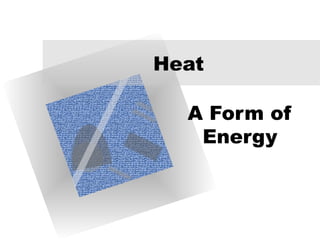
Heat
- 1. Heat A Form of Energy
- 2. Molecules and Motion • The motion of molecules produces heat • The more motion, the more heat is generated
- 3. Heat Transfer • The movement of heat from a warmer object to a colder one
- 4. Forms of heat transfer • Three forms of heat transfer: • Conduction • Convection • Radiation
- 5. Conduction • Conduction involves the transfer of heat through direct contact • Heat conductors conduct heat well, insulators do not
- 6. Convection • Takes place in liquids and gases as molecules move in currents • Heat rises and cold settles to the bottom
- 7. Radiation • Heat is transferred through space • Energy from the sun being transferred to the Earth
- 8. Questions • What are the three types of heat transfer? • How is conduction different from radiation?
- 9. What type of heat transfer is involved? • Heating a room with a fireplace • Egg cooking in a frying pan • Roof of a house becoming hot
- 10. What type of heat transfer? • Warm air mass bringing a change in the weather • Wire getting hot from an electric appliance
- 11. Temperature and Heat • Kinetic energy is the energy of motion • Temperature is the measure of the average kinetic energy of an object
- 12. Question • How is kinetic energy related to heat production?
- 13. Thermometer • A instrument used to measure temperature • Thermometers commonly have alcohol (with dye) or mercury • Digital thermometers have replaced older ones
- 14. Celsius Scale • Celsius is the metric scale for measuring temperature • Water freezes at 0ºC and boils at 100ºC
- 15. Kelvin scale • The Kelvin scale is a metric temperature scale measured in Kelvin units (K) • Formula (273+ºC)= Kelvin
- 16. Questions • What is the formula for converting a Celsius temperature to a Kelvin temperature? • What is the boiling point of water on the Kelvin scale? • What is the freezing point of water on the Kelvin scale?
- 17. Absolute zero • The temperature in which all molecular motion stops (0 K)
- 18. Questions • Describe absolute zero. • What is absolute zero on the Celsius scale?
- 19. Measuring Heat • Increase in temperature • Addition of heat • A decrease in temperature • Removal of heat
- 20. Calories • Unit for measuring heat • The amount of heat needed to raise 1 gram of water one degree Celsius
- 21. Temperature • Joule is another unit for measuring heat • Mass and type of substance determine the amount of temperature change
- 22. Specific Heat • The ability of a substance to absorb heat energy (specific heat) • Different substances absorb heat at different rates • The greater the mass of the object the more heat is absorbed
- 23. What is a calorimeter? • Device used to measure the heat given off during chemical reactions
- 24. Questions • How can heat be measured? • What is the unit used to measure heat? • What is specific heat?
- 25. Heat and Phase Changes • A phase change is a physical change that requires a change in heat energy • Addition or removal of HEAT
- 26. Questions • What is freezing point, melting point, and boiling point?
- 27. Heat expansion • The expansion of a substance due to heat • Most solids, liquids, and gases expand as they are heated
- 28. Expansion of water • Between 4ºC and 0ºC, water EXPANDS as it cools and turns into a solid
- 29. Thermostat • A thermostat is a device that controls the temperature • The switch of a thermostat is a bimetallic strip
- 30. Bimetallic Strip • Two different metals that are bound together • They expand at different rates when heated • Used as a switch in a thermostat
- 31. Internal energy • The energy within a substance
- 32. Questions • What is internal energy? • What is a thermostat? • Describe the switch of a thermostat. • What happens to most substances when heat is added?